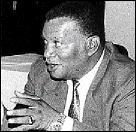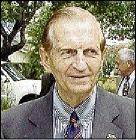Harper loses appeal against Seaga
Published: Tuesday | June 30, 2009

Harper
The United Kingdom Privy Council has barred former Deputy Commissioner of Police Leslie Harper from claiming a total of $20 million in insurance and success fees as legal costs from former Jamaica Labour Party leader Edward Seaga.
Harper's claim arose from a suit he had won against Seaga for slander.
In January 2008, the Privy Council dismissed Seaga's appeal and upheld a Court of Appeal ruling that he must pay Harper, who is now an attorney-at-law, $1.5 million for defamation of character.
The courts found that Harper's reputation had been damaged by statements made by Seaga at a public forum in March 1996.
Seaga, at the meeting, had challenged Government's plans to replace Trevor MacMillan with Harper as police commissioner.
Supreme Court Judge Patrick Brooks ordered Seaga to pay Harper $3.5 million. Seaga then took his case to the Court of Appeal, which upheld the decision in December 2005, but reduced the award to $1.5 million.
'Qualified privilege'

Seaga
Seaga turned to the Privy Council in January 2006. His lawyers argued that he had 'qualified privilege' when he spoke at the Wyndham Kingston Hotel on March 6, 1996. They said he had a duty as then Opposition Leader to warn the public of Harper's perceived bias.
The Privy Council disagreed.
When Harper took his case to the Privy Council, his English solicitors and lawyers agreed to represent him at the proceedings under conditional fee agreements. Harper also took out after-the-event (ATE) insurance cover.
When Harper's bill of costs was lodged with the registrar of the Privy Council, it was referred to the senior costs judge, Master Hurst, for taxation.
The Privy Council ruled that the laws of Jamaica did not permit conditional fee agreements or allow for a successful party's expenditure on an ATE premium to be an allowable disbursement.
The Privy Council said in contrast, Section 21 of Jamaica's Legal Profession Act allowed for contingency fee agreements.
The Privy Council, in dismissing Harper's claim for costs, said it should be borne in mind that a liability to pay $1.5 million in damages (just over one-eighth of the basic costs allowed by Master Hurst) was what was under challenge.








